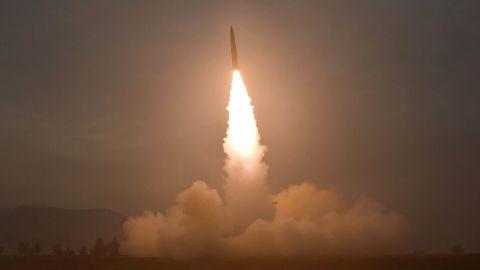Kim Jong Un talks up North Korea’s nuclear threat after latest missile tests | CNN

Seoul, South Korea
CNN
—
North Korean leader Kim Jong Un on Thursday warned adversaries his nuclear forces are fully prepared for “actual war,” a day after the isolated country’s latest launch in a recent flurry of missile tests.
“Our nuclear combat forces … proved again their full preparedness for actual war to bring the enemies under their control,” Kim said in a report by the state-run Korean Central News Agency (KCNA).
Kim’s fiery statement – his first about North Korea’s missile program for several months – came after he reportedly oversaw the test Wednesday of long-range cruise missiles over waters west of the Korean Peninsula, according to KCNA.
Wednesday marked the 26th missile test of either cruise or ballistic missiles by the Kim regime this year, according to a CNN count, though analysts stressed that the KCNA reports should be treated with caution as North Korean state media had previously overstated the success of such launches.
On Monday, North Korean state media broke six months of silence over this year’s spate of missile tests, claiming they were part of a series of simulated procedures intended to demonstrate Pyongyang’s readiness to fire tactical nuclear warheads at potential targets in South Korea.
In Monday’s report, KCNA said North Korea’s recent missile tests showed the country’s forces were “fully ready to hit and wipe out the set objects at the intended places in the set time.”
Kim Jun-rak, a spokesperson for South Korea’s Joint Chiefs of Staff, confirmed that North Korea launched two cruise missiles from the Kaechon area, South Phyongan province, from 2 a.m. local time Wednesday over the West Sea, also known as the Yellow Sea.
“The South Korean military was aware of the situation in real time and maintained a readiness posture by closely cooperating with the US while strengthening surveillance and vigilance,” Kim said at a briefing on Thursday.
The US Indo-Pacific Command said it had no comment on the reports of Wednesday’s test.
The KCNA report claimed the cruise missiles tested Wednesday flew oval and figure-8 patterns for almost three hours above the sea before hitting their target.

Analysts stressed caution over the KCNA reports.
“It is worth remembering that the details of these reports cannot be trusted,” said Leif-Eric Easley, associate professor of international studies at Ewha Womans University in Seoul. “The Kim regime is sometimes surprisingly transparent about weapons development goals, but it also tends to exaggerate strength and capabilities.”
But Easley and others stressed that the North Korean reports should not be dismissed as pure bluster by South Korea and the West.
Kim Dong-yub, a professor at the University of North Korean Studies in Seoul, said North Korean missile tests show a progressing program even if current strengths are exaggerated.
“The fact that Kim Jong Un oversaw this missile launch suggests that the cruise missile is at the final stage of development,” he said.
Cruise missiles have substantial differences with ballistic missiles, which have formed the large majority of North Korea’s tests this year.
A ballistic missile is launched using a rocket or rockets, then travels outside of Earth’s atmosphere, gliding in space before reentry and then descending powered only by gravity to its target.
A cruise missile is powered by a jet engine, stays inside Earth’s atmosphere during its flight and is maneuverable with control surfaces similar to an airplane’s.
Cruise missiles have smaller payloads than ballistic missiles, so would require a smaller nuclear warhead than a missile designed to hit the mainland United States, such as an intercontinental ballistic missile.
United Nations Security Council resolutions ban North Korea from testing ballistic missiles, but no such restriction applies to the testing of cruise missiles.
North Korea’s ability to deploy a nuclear warhead on any kind of missile is unproven.
Shin Beom-chul, South Korea’s vice defense minister, told local radio station SBS Thursday morning the spate of missile testing and threatening announcements from Pyongyang shows North Korea may be building up to testing a nuclear device for the seventh time. Its last test was in 2017.
“North Korea is testing various missiles. And now they’ve tested cruise missiles, and I think they’ll test the tactical nuclear weapon part that can be loaded on each warhead,” Shin said.
“North Korea hasn’t conducted a tactical nuclear test, so it needs to make the nuclear warheads smaller and verify them,” he said.
Even if it doesn’t test a nuclear weapon, North Korea’s new propaganda campaign presents a problem, said Easley, the Ewha University professor.
“Pyongyang’s military threats are a chronic and worsening problem for peace and stability in Asia,” Easley said.
“Policymakers in Seoul, Tokyo and Washington should not allow domestic politics and other challenges such as Russia’s war in Ukraine to prevent them from increasing international coordination on military deterrence and economic sanctions” on Pyongyang, he said.








